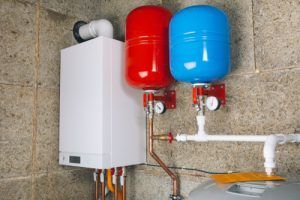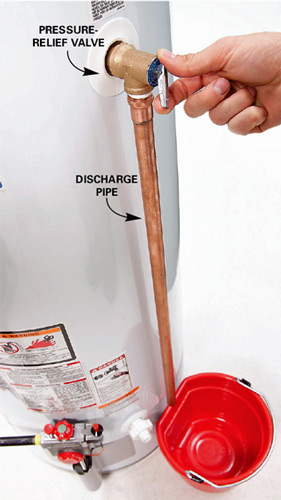Addressing the Everyday Heater Urgent Problems
Addressing the Everyday Heater Urgent Problems
Blog Article
Everyone may have their personal conception when it comes to The Importance of Water Heater Maintenance.

A water heater is among the most important standard appliances that can be found in a residence. With hot water heater, you don't require to go through the tension of heating water manually every time there is a demand to wash, do the laundry, or the dishes. Nonetheless, there is always an opportunity that your hot water heater would act up as with most mechanical devices.
It is necessary to keep in mind any kind of little breakdown and tackle it swiftly before points leave hand. Many times, your hot water heater starts to malfunction when there is an accumulation of debris as a result of continual use. As a safety measure, regular flushing of your hot water heater is recommended to avoid debris buildup as well as protect against practical failing.
Usual water heater emergencies and how to take care of them
Inadequate warm water
It may be that the water heating system can't support the hot water demand for your home. You could upgrade your water heating system to one with a bigger capacity.
Changing water temperature level.
Your hot water heater could start creating water of different temperature levels generally ice cold or hot warm. In this scenario, the first thing you do is to ensure that the temperature is readied to the wanted level. If after doing this, the water temperature maintains altering throughout showers or various other activities, you might have a malfunctioning thermostat. There might be a requirement to change either the heating or the thermostat system of your water heater.
Dripping water heater container.
A leaking tank could be an indicator of corrosion. It can trigger damages to the floor, wall and also electric tools around it. You could even go to risk of having your apartment or condo swamped. In this situation, you ought to switch off your hot water heater, enable it to cool off, and also thoroughly search for the resource of the issue. Sometimes, all you require to do is to tighten up a couple of screws or pipe links in cases of minor leaks. If this doesn't work as well as the leakage persists, you might need to use the services of a professional for a proper substitute.
Blemished or smelly water
When this takes place, you require to understand if the concern is from the water or the container resource. If there is no amusing odor when you run cold water, then you are particular that it is your water heating system that is faulty. The odiferous water can be created by rust or the accumulation of microorganisms or debris in the water heating unit tank.
Final thought
Some home owners disregard little caution and minor faults in their water heater system. This only brings about further damage as well as a feasible full breakdown of your home appliance. You must manage your hot water heater mistakes as quickly as they come near stay clear of even more expenditures as well as unneeded emergency troubles.
With water heaters, you do not require to go with the tension of heating water manually every time there is a demand to take a bathroom, do the washing, or the dishes. It might be that the water heating unit can not support the warm water demand for your apartment. Your water heating system could start generating water of different temperature levels typically ice hot or cold warm. If there is no amusing smell when you run chilly water, after that you are certain that it is your water heating unit that is damaged. The stinky water can be triggered by corrosion or the accumulation of microorganisms or debris in the water heater tank.
Water Heater Burst: Why This Happens And What To Do Next
Water Heater Explosion Warning Signs
Since storage water heaters are made of metal and store large volumes of heated water, they carry an increased risk of leaking or even exploding as they begin to rust at the fittings and seams over time. If the thermostat controlling the water temperature within the tank is faulty, or if mineral buildup inside the water heater prevents the thermostat from sensing the water’s temperature correctly, the water could become overheated. This will expand its volume within the tank, causing it to press at the tank’s fittings and seams. If these fittings and seams are rusted or corroded, the pressure could result in a leak or even an explosion.
Here are some risk factors and warning signs of an increased risk of water heater leak or explosion:
Your water heater is more than 10 years old. Your water heater makes clanking, banging or rumbling noises as it heats up, indicating that sediment has built up and hardened inside the tank. There is visible rust on the outside of the water heater, especially located at the pipe fittings or the seams that run down the tank. There is rusty water coming from your water heater, indicating that there may be rust building up inside. Your water heater is leaking, which could indicate either a crack somewhere in the tank or a malfunctioning temperature-and-pressure (T&P) relief valve. What To Do When Water Heater Leaks
If you find water dripping or seeping out of your water heater, or pooling around it, it means your water heater is leaking. If you find a leak, it may be best to call a plumbing professional to diagnose the problem and determine how best to handle it. If you choose to tackle it on your own, there are a few things you can do.
TURN OFF THE POWER
Next, shut off the power to the hot water tank at your home’s electrical breaker box. If you don’t shut off the power, the heating elements within the tank could continue to stay hot, which could pose a fire risk.
If you have a gas-powered water heater, you’ll also need to shut off the gas line leading into the tank.
FIND THE LEAK
Now it’s time to determine where the leak is coming from. Likely locations are the T&P valve, the drain valve or one of the pipes or fittings that feed into the top of the tank. If you see any rust or corrosion on the outside of your water heater’s tank, pipes or fittings, these could also be the source of the leak.
REPAIR THE LEAK
Once you determine the source of your water heater leak, you’ll have a better idea of what steps you need to take to fix the problem. It may be a simple fix—such as using a wrench to tighten fittings or replacing the T&P valve—but it may be something more complicated. You may even need to drain the tank, remove the water heater and install a new one.
https://www.abchomeandcommercial.com/blog/water-heater-burst/

Do you appreciate more info about Common Hot Water Heater Problems? Make a remark down the page. We would be interested to see your ideas about this review. We hope that you visit us again in the near future. So long as you liked our blog post if you please be sure to pass it around. I praise you for your time. Please come by our website back soon.
Plumbing care available. Report this page